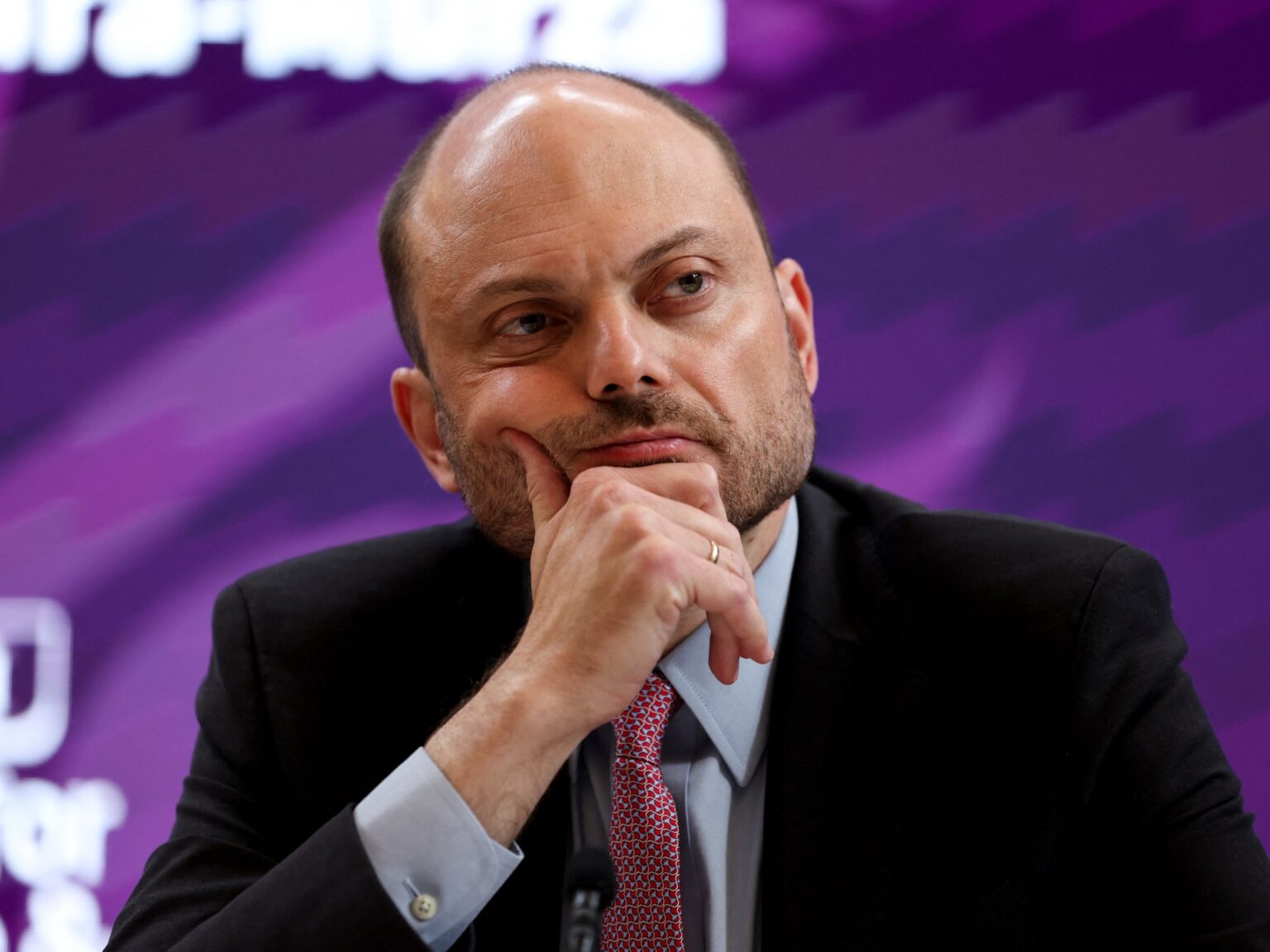Kyiv, Ukraine – Vladimir Kara-Murza barely survived two suspected poisonings in 2015 and 2017 that he claimed were orchestrated by the Kremlin.
The bearded, balding 43-year-old may not be as outspoken as opposition leader Alexey Navalny, who nearly died of similar nerve agent poisoning in 2020.
But Kara-Murza, a Cambridge-educated historian, has been instrumental in convincing Western governments to slap personal sanctions on dozens of Russian officials.
In 2023, a Moscow court sentenced him to 25 years in jail for “treason” and while behind bars, he won a Pulitzer Prize for his columns for The Washington Post.
Released last year as part of a prisoner swap, Kara-Murza settled in Germany and continued his advocacy work against Russian President Vladimir Putin’s government and Moscow’s war in Ukraine.
But last week, Kara-Murza’s remarks about the ethnic identity and alleged bloodthirst of Russian servicemen rattled many on both sides of Europe’s hottest armed conflict.
“As it turns out, [ethnic] Russians find it psychologically difficult to kill Ukrainians,” Kara-Murza told the French Senate on Thursday while explaining why Russia’s Ministry of Defence enlists ethnic minorities.
“Because [ethnic Russians and Ukrainians] are the same, we’re similar people, we have an almost similar language, same religion, hundreds and hundreds of years of common history,” said Kara-Murza.
Russians and Ukrainians are ethnic Slavs whose statehood dates back to Kyivan Rus, medieval Eastern Europe’s largest state torn apart by Mongols, Poles and Lithuanians.
“But to someone who belongs to another culture, it is allegedly easier” to kill Ukrainians, Kara-Murza added.
His remarks made observers and Indigenous rights advocates flinch and fume.
A former Russian diplomat said “measuring the degree of one’s cruelty by their ethnicity is a dead end.”
The Kremlin does not specifically “recruit minorities, they recruit people from the poorest regions, and those are, as a rule, ethnic autonomies”, Boris Bondarev, who quit his Ministry of Foreign Affairs job in protest against Russia’s 2022 full-scale invasion of Ukraine, told Al Jazeera.
“Only a dull man could say that in the war’s fourth year in a multiethnic society,” said Indigenous peoples activist Dmitry Berezhkov, of the Itelmen nation on Russia’s Pacific peninsula of Kamchatka.
Russian liberal opposition figures, mostly middle-class urbanites, “drown as soon as they tread on the thin ice” of ethnic minority issues, he added.
Ethnic Russians constitute more than two-thirds of Russia’s population of 143 million. The rest are minorities – from millions of ethnic Ukrainians and Tatars to smaller Indigenous groups in Siberia and the Arctic that have regional autonomy, albeit mostly nominal.
Even in regions rich in hydrocarbons, rare earths or diamonds, the minorities live in rural, often inhospitable areas, co-existing and mingling with ethnic Russians.
They all rely on Kremlin-funded television networks more than urban dwellers, often have no internet access and see the sign-up bonuses and salaries of servicemen fighting in Ukraine as a ticket out of the dire poverty their families live in.
Recruits receive up to $50,000 when they sign up, and earn several thousand dollars a month – a fortune for anyone from those regions irrespective of their ethnic background.
“This is colossal money for them, they will never earn it in their lives, no matter whether they are Buryat or Russian,” Bondarev said.
In response to a squall of criticism, Kara-Murza wrote on Facebook on Monday that the accusations were mere “lies, manipulations and slander”.
To Berezhkov, the comment further tainted Kara-Murza’s image.
“In the past, [Kara-Murza’s words] could be seen as a mistake – but now, they are his position,” he said.
To another minority rights advocate, Kara-Murza’s diatribe sounded like a “signal for future voters” in the post-war, liberal Russia that exiled Kremlin critics hope to return to.
Oyumaa Dongak, who fled Tyva, a Turkic-speaking province that borders China, thinks Kara-Murza and other exiled Russian opposition leaders are “competing” with Putin.
“It’s not him, it’s us who defend [ethnic] Russians,” she told Al Jazeera.
In 2024, Kara-Murza said Western sanctions imposed on Moscow after the 2022 invasion are “unfair and counterproductive” and hurt Russians at large. He wanted the West to lift wider sanctions and instead target individual officials.
A Ukrainian observer said Kara-Murza does not want ethnic Russians who can potentially vote for now-exiled opposition leaders to feel collective guilt for the atrocities committed in Ukraine.
“People don’t feel guilty. If you club them in the head with moral condemnation every day, people will not admit their guilt but will hate anyone who clubs them,” Kyiv-based analyst Vyacheslav Likhachyov told Al Jazeera.
“That’s why the tales about the atrocities of Chechen executioners and Buryat rapists are and will be popular,” he said.
Fighters deployed by Chechnya’s pro-Kremlin leader Ramzan Kadyrov were dubbed a “TikTok army” for staged videos of them “storming” Ukrainian strongholds.
Their actual role in the war is mostly reduced to guarding occupied areas, terrifying and torturing ethnic Russian servicemen who refuse to fight.
But Buryats, Buddhist natives of a scarcely populated and impoverished region near Mongolia, have become notorious in Ukraine in 2022.
Human rights groups and Ukrainian officials identified personal details of some Buryat soldiers that tortured, raped and killed civilians in Bucha and other towns north of Kyiv.
But as ethnic Buryats are hard to distinguish from other minority servicemen with distinctly Asian features, Ukrainians often label them all “Buryats”, a community activist said.
“All Caucasus natives are seen as Chechens, and all Asians are considered Buryats,” Aleksandra Garmazhapova, who helps Buryat men escape mobilisation and flee abroad, told Al Jazeera.
However, the overwhelming majority of servicemen who committed alleged war crimes in Bucha were reportedly ethnic Russians.
Garmazhapova survived because Ukrainian forces started shelling Russian positions, and his captors fled to a basement.
“Slavs, Slavs, they were all Slavs,” Viktor, a Bucha resident who was doused with fuel by Russian servicemen who placed bets on how far he would run once they set him on fire, told Al Jazeera in 2022, just days after his ordeal.
https://www.aljazeera.com/news/2025/4/23/kremlin-critic-decried-for-racist-rant-on-minorities-fighting-for-russia?traffic_source=rss


